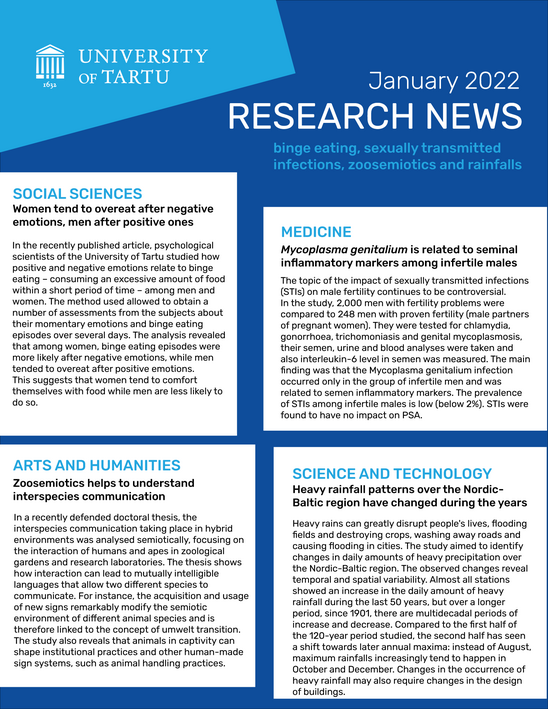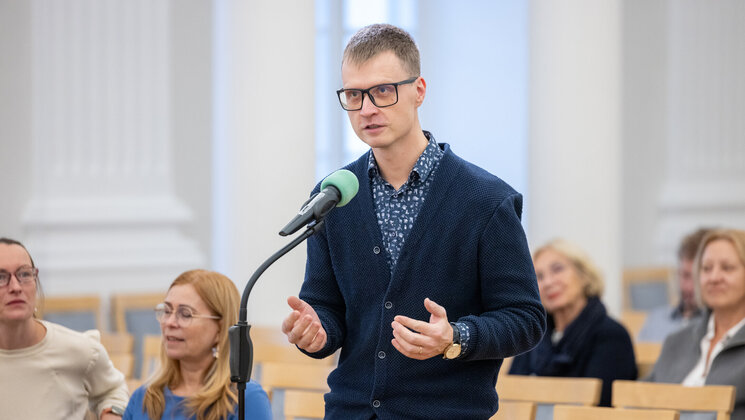-
Faculty of Arts and HumanitiesDean's Office, Faculty of Arts and HumanitiesJakobi 2, r 116-121 51005 Tartu linn, Tartu linn, Tartumaa EST0Institute of History and ArchaeologyJakobi 2 51005 Tartu linn, Tartu linn, Tartumaa EST0Institute of Estonian and General LinguisticsJakobi 2, IV korrus 51005 Tartu linn, Tartu linn, Tartumaa EST0Institute of Philosophy and SemioticsJakobi 2, III korrus, ruumid 302-337 51005 Tartu linn, Tartu linn, Tartumaa EST0Institute of Cultural ResearchÜlikooli 16 51003 Tartu linn, Tartu linn, Tartumaa EST0Institute of Foreign Languages and CulturesLossi 3 51003 Tartu linn, Tartu linn, Tartumaa EST0School of Theology and Religious StudiesÜlikooli 18 50090 Tartu linn, Tartu linn, Tartumaa EST0Viljandi Culture AcademyPosti 1 71004 Viljandi linn, Viljandimaa EST0Professors emeriti, Faculty of Arts and Humanities0Associate Professors emeriti, Faculty of Arts and Humanities0Faculty of Social SciencesDean's Office, Faculty of Social SciencesLossi 36 51003 Tartu linn, Tartu linn, Tartumaa EST0Institute of EducationJakobi 5 51005 Tartu linn, Tartu linn, Tartumaa EST0Johan Skytte Institute of Political StudiesLossi 36, ruum 301 51003 Tartu linn, Tartu linn, Tartumaa EST0School of Economics and Business AdministrationNarva mnt 18 51009 Tartu linn, Tartu linn, Tartumaa EST0Institute of PsychologyNäituse 2 50409 Tartu linn, Tartu linn, Tartumaa EST0School of LawNäituse 20 - 324 50409 Tartu linn, Tartu linn, Tartumaa EST0Institute of Social StudiesLossi 36 51003 Tartu linn, Tartu linn, Tartumaa EST0Narva CollegeRaekoja plats 2 20307 Narva linn, Ida-Virumaa EST0Pärnu CollegeRingi 35 80012 Pärnu linn, Pärnu linn, Pärnumaa EST0Professors emeriti, Faculty of Social Sciences0Associate Professors emeriti, Faculty of Social Sciences0Faculty of MedicineDean's Office, Faculty of MedicineRavila 19 50411 Tartu linn, Tartu linn, Tartumaa ESTInstitute of Biomedicine and Translational MedicineBiomeedikum, Ravila 19 50411 Tartu linn, Tartu linn, Tartumaa ESTInstitute of PharmacyNooruse 1 50411 Tartu linn, Tartu linn, Tartumaa ESTInstitute of DentistryL. Puusepa 1a 50406 Tartu linn, Tartu linn, Tartumaa ESTInstitute of Clinical MedicineL. Puusepa 8 50406 Tartu linn, Tartu linn, Tartumaa ESTInstitute of Family Medicine and Public HealthRavila 19 50411 Tartu linn, Tartu linn, Tartumaa ESTInstitute of Sport Sciences and PhysiotherapyUjula 4 51008 Tartu linn, Tartu linn, Tartumaa ESTProfessors emeriti, Faculty of Medicine0Associate Professors emeriti, Faculty of Medicine0Faculty of Science and TechnologyDean's Office, Faculty of Science and TechnologyVanemuise 46 - 208 51003 Tartu linn, Tartu linn, Tartumaa ESTInstitute of Computer ScienceNarva mnt 18 51009 Tartu linn, Tartu linn, Tartumaa ESTInstitute of GenomicsRiia 23b/2 51010 Tartu linn, Tartu linn, Tartumaa ESTEstonian Marine Institute0Institute of PhysicsInstitute of ChemistryRavila 14a 50411 Tartu linn, Tartu linn, Tartumaa EST0Institute of Mathematics and StatisticsNarva mnt 18 51009 Tartu linn, Tartu linn, Tartumaa EST0Institute of Molecular and Cell BiologyRiia 23, 23b - 134 51010 Tartu linn, Tartu linn, Tartumaa ESTTartu ObservatoryObservatooriumi 1 61602 Tõravere alevik, Nõo vald, Tartumaa EST0Institute of TechnologyNooruse 1 50411 Tartu linn, Tartu linn, Tartumaa ESTInstitute of Ecology and Earth SciencesJ. Liivi tn 2 50409 Tartu linn, Tartu linn, Tartumaa ESTProfessors emeriti, Faculty of Science and Technology0Associate Professors emeriti, Faculty of Science and Technology0Institute of BioengineeringArea of Academic SecretaryHuman Resources OfficeUppsala 6, Lossi 36 51003 Tartu linn, Tartu linn, Tartumaa EST0Area of Head of FinanceFinance Office0Area of Director of AdministrationInformation Technology Office0Administrative OfficeÜlikooli 17 (III korrus) 51005 Tartu linn, Tartu linn, Tartumaa EST0Estates Office0Marketing and Communication OfficeÜlikooli 18, ruumid 102, 104, 209, 210 50090 Tartu linn, Tartu linn, Tartumaa EST0Area of Vice Rector for DevelopmentCentre for Entrepreneurship and InnovationNarva mnt 18 51009 Tartu linn, Tartu linn, Tartumaa EST0University of Tartu Natural History Museum and Botanical GardenVanemuise 46 51003 Tartu linn, Tartu linn, Tartumaa EST0International Cooperation and Protocol Office0University of Tartu MuseumLossi 25 51003 Tartu linn, Tartu linn, Tartumaa EST0Area of RectorRector's Strategy OfficeInternal Audit OfficeArea of Vice Rector for Academic AffairsOffice of Academic AffairsUniversity of Tartu Youth AcademyUppsala 10 51003 Tartu linn, Tartu linn, Tartumaa EST0Student Union OfficeÜlikooli 18b 51005 Tartu linn, Tartu linn, Tartumaa EST0Centre for Learning and TeachingArea of Vice Rector for ResearchUniversity of Tartu LibraryW. Struve 1 50091 Tartu linn, Tartu linn, Tartumaa EST0Grant Office
Research news: binge eating, sexually transmitted infections, zoosemiotics and rainfalls

The research news section gives regular hints about interesting studies in various fields of research.
Social sciences
Women tend to overeat after negative emotions, men after positive ones
In the recently published article, psychological scientists of the University of Tartu studied how positive and negative emotions relate to binge eating – consuming an excessive amount of food within a short period of time – among men and women. The method used allowed to obtain a number of assessments from the subjects about their momentary emotions and binge eating episodes over several days. The analysis revealed that among women, binge eating episodes were more likely after negative emotions, while men tended to overeat after positive emotions. This suggests that women tend to comfort themselves with food while men are less likely to do so.
Read more in the article.
Further information:
Hedvig Sultson, Junior Research Fellow in Clinical and Experimental Psychology, hedvig.sultson@ut.ee
Kairi Kreegipuu, Professor of Experimental Psychology, kairi.kreegipuu@ut.ee
Kirsti Akkermann, Associate Professor in Clinical Psychology, kirsti.akkermann@ut.ee
Medicine
Mycoplasma genitalium is related to seminal inflammatory markers among infertile males
The topic of the impact of sexually transmitted infections (STIs) on male fertility continues to be controversial. Gonorrhoeae and chlamydia have been proven to harm male fertility, but little is known about trichomonas and Mycoplasma genitalium. The study by University of Tartu researchers aimed to investigate the prevalence of causes of STIs such as chlamydia (Chlamydia trachomatis), gonococci (Neisseria gonorrhoeae), trichomonas (Trichomonas vaginalis) and Mycoplasma genitalium among infertile males to analyse the effect of these STIs on semen parameters and prostate-specific antigen (PSA) in blood. In the study, 2,000 men with fertility problems were compared to 248 men with proven fertility (male partners of pregnant women). They were tested for chlamydia, gonorrhoea, trichomoniasis and genital mycoplasmosis, their semen, urine and blood analyses were taken and also interleukin-6 level in semen was measured. The main finding was that the Mycoplasma genitalium infection occurred only in the group of infertile men and was related to semen inflammatory markers. The prevalence of STIs among infertile males is low (below 2%). STIs were found to have no impact on PSA.
Read more in the article.
Further information: Stanislav Tjagur, doctoral student in Medicine, stanislav.tjagur@kliinikum.ee
Arts and humanities
Zoosemiotics helps to understand interspecies communication
Interspecies communication is a hotly-debated topic in ever-expanding environments like cities, where it shapes the quotidian interactions of different animal agents, including humans. In a recently defended doctoral thesis, the interspecies communication taking place in hybrid environments was analysed semiotically, focusing on the interaction of humans and apes in zoological gardens and research laboratories. It was analysed through the lens of zoosemiotics, enabling the researcher to abandon an anthropocentric perspective and adopt that of other species. The umwelt model used in the research proves to be an inspiring and powerful tool that we can use to (partially) access the world of other organisms. In the thesis, the author develops the concept of "umwelt overlap", namely the idea that the umwelt should not merely be understood as a species-specific nor as an organism-specific model, but should rather be expanded to encompass areas of shared meanings. The thesis shows how interaction can lead to mutually intelligible languages that allow two different species to communicate. For instance, the acquisition and usage of new signs remarkably modify the semiotic environment of different animal species and is therefore linked to the concept of umwelt transition. The study also reveals that animals in captivity can shape institutional practices and other human-made sign systems, such as animal handling practices. The research proposes several practices to improve animal welfare in captivity.
Read more in the doctoral thesis.
Further information: Mirko Cerrone, PhD in Semiotics and Culture Studies, mirko.cerrone@ut.ee
Science and technology
Heavy rainfall patterns over the Nordic-Baltic region have changed during the years
Heavy rains can greatly disrupt people's lives, flooding fields and destroying crops, washing away roads and causing flooding in cities. As temperatures increase, the atmosphere can hold more moisture and the potential for more frequent and intense rainfall and the related damage is present. The study aimed to identify changes in daily amounts of heavy precipitation over the Nordic-Baltic region. The observed changes reveal temporal and spatial variability. Almost all stations showed an increase in the daily amount of heavy rainfall during the last 50 years, but over a longer period, since 1901, there are multidecadal periods of increase and decrease. Compared to the first half of the 120-year period studied, the second half has seen a shift towards later annual maxima: instead of August, maximum rainfalls increasingly tend to happen in October and December. Changes in the occurrence of heavy rainfall may also require changes in the design of buildings.
Read more in the article.
Further information: Piia Post, Associate Professor in Meteorology and Climatology, piia.post@ut.ee

Read more similar news






